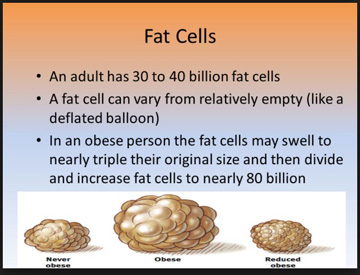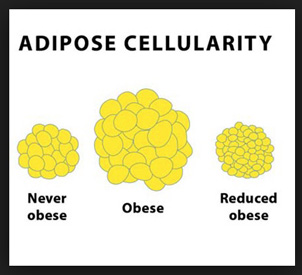Set Point Explained
- POSTED ON: May 01, 2019
The podcast below contains a relatively simple, very understandable
and exceptionally accurate explanation of Set Point.

Below are links to some additional DietHobby articles involving the Set Point issue.
Set Point
Running DOWN the UP Escalator - Weight Loss & Maintenance
False Assumption
- POSTED ON: Apr 10, 2018

See Video Below: The Problem with Poodle Science
Three Obesity Types
- POSTED ON: Mar 12, 2018

 The medical profession has no cure for obesity. While many people will diet, exercise, and thus, lose weight - keeping that weight off is where the real struggle lies.
The medical profession has no cure for obesity. While many people will diet, exercise, and thus, lose weight - keeping that weight off is where the real struggle lies.
Below is an article and a video in which Dr. Sharma, who-is-one-of-the-medical-obesity-experts-that-I-admire-and-respect, explores the complex biology behind weight loss and regain, and gives his medical opinion as to why obesity should be managed as a chronic disease rather than as a personal failure.
The Three Clinical Faces of Obesity
by Dr. Arya Sharma M.D.
In my experience, patients presenting with obesity tend to fall into three categories, each of which requires a distinct management approach. They are:
1) Active Gainers
2) Weight Stable
3) Post-Weight Loss
Active Gainers are patients currently at their lifetime maximum and continuing to gain significant amounts of weight – i.e. more than the usual 0.5 to 1 lb/year. Patients in this category require immediate attention – if nothing happens, their weight will most likely just continue to increase.
The good news is that in almost every patient in this category, there is an identifiable reason for the ongoing weight gain – this can be psychosocial (e.g. depression, binge-eating disorder, etc.), due to a medical comorbidity (arthritis, chronic pain, etc.) or medications (e.g. atypical antipsychotics, hypoglycemic agents, etc.).
From a management perspective, the sooner we identify and address the underlying problem, the sooner we can slow or even halt the rate of weight gain – in this patient – gaining less weight than before is the first sign of success. There is really no point trying to embark on losing weight as long as the underlying problem driving the weight gain has not been addressed, as this is likely to make sustained weight loss even more unlikely that it already is..
Weight Stable patients are those that present with excess weight but are relatively weight stable. Even though they may be at their lifetime maximum, they have been pretty much the same weight (perhaps a few lbs up or down but nothing drastic) for several years (sometimes even decades). By definition, a patient who is weight stable is in caloric balance, and thus, by definition is not eating too much. In fact, these patients are eating the exact number of calories needed to sustain their bodies...
Fat Cells are Forever
- POSTED ON: Oct 04, 2017


Once fat cells reach a certain size -- that is, they become filled to capacity with fat content -- then new fat cells will begin to form. The fat cell number and size increases and shrinks based on deposits from food intake.
“We have a seemingly infinite capacity to recruit new fat cells, but we cannot get rid of them once they have been recruited" said Michael Rosenbaum, associate professor of clinical pediatrics and medicine at Columbia University. "in most cases, weight gain initially reflects ... enlargement of existing fat cells followed by an increased growth of new fat cells.”
Research has shown that obese people who have weight loss surgery have just as many fat cells two years after the surgery as before it, even though they have become much thinner.
Scientist, Dr. Rudy Leibel, says that "the body controls the number of its fat cells as carefully as it controls the amount of its fat". Fat cells die and new ones are born throughout life. Scientists have found that fat cells live for only about seven years and that every time a fat cell dies, another is formed to take its place.
Below see a 2017 New York Times article about this matter.
 Are Fat Cells Forever?
Are Fat Cells Forever?
By Alice Callahan
February 17, 2017 - New York Times
Once fat cells are formed, can you ever get rid of them?
The number of fat cells in a person’s body seems to be able to change in only one direction: up. Fat cell number increases through childhood and adolescence and generally stabilizes in adulthood.
But this doesn’t mean that fat cells, or adipocytes, are stagnant. The size of individual fat cells is remarkably variable, expanding and contracting with weight gain or weight loss. And as with most cell types in the body, adipocytes die eventually.
“when old ones die, they are replaced by new fat cells,” said Dr. Michael Jensen, an endocrinologist and obesity researcher at the Mayo Clinic. Cell death and production appear to be tightly coupled, so although about 10 percent of adipocytes die each year, they’re replaced at the same rate.
Even among bariatric surgery patients, who can lose massive amounts of weight, the number of fat cells tends to remain the same, although the cells shrink in size, studies show.
Liposuction reduces the number of fat cells in a person&rsqu...
Our Weight is Regulated by Our Biological System
- POSTED ON: Oct 01, 2017

![]() I continually read a great many books, articles, blogs, and forum posts on the subject of obesity.
I continually read a great many books, articles, blogs, and forum posts on the subject of obesity.
No one,…. not even the most qualified medical doctor or scientist, … knows everything or holds only beliefs that are absolutely correct.
However, I am often amazed by the vast amount of existing misconceptions, myths, and wishful-thinking that gets spread and promoted by people who present themselves as obesity “experts” or “gurus”.
One thing that Scientists know for sure about obesity management, is the sad fact, that no diet, exercise, medication, not even bariatric surgery, will permanently reset the body’s tendency to defend and regain its body weight to its set point .... this generally being the highest weight that has been achieved and maintained for a notable length of time.

Thus, any effective long-term treatment MUST OFFSET the complex neurobiology which is designed to eventually doom every weight-loss attempt to ultimately "fail".
 A comprehensive review recently published in Endocrine Reviews describes the complexity of the biological system that regulates our body weight.
A comprehensive review recently published in Endocrine Reviews describes the complexity of the biological system that regulates our body weight.
The 30+ page research paper, backed by about 350 scientific citations, was written by the undisputed leaders in the medical field of Endocrinology (Michael Schwartz, Randy Seeley, Eric Ravussin, Rudolph Leibel and colleagues) and is actually a “Scientific Statement” from the Endocrine Society.
In other words, these Scientists know that they are talking about when they speak about the Science of Energy Balance, and in this paper they outline in excruciating scientific detail just how complex the biological system that regulates, defends, and restores body weight actually is.
From the Abstract of this research paper:
We included evidence from basic science, clinical, and epidemiological literature to assess current knowledge regarding mechanisms underlying excess body-fat accumulation, the biological defense of excess fat mass, and the tendency for lost weight to be regained.
A major area of emphasis is the science of energy homeostasis, the biological process that maintains weight stability by actively matching energy intake to energy expenditure over time.
Growing evidence suggests that obesity is a disorder of the energy homeostasis system, rather than simply arising from the passive accumulation of exce...
Page 1 | Page 2 | Page 3 | Page 4 | Page 5 | Page 11 | Next Page >> Oldest >>







